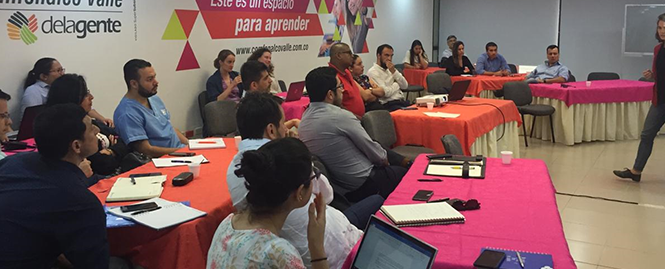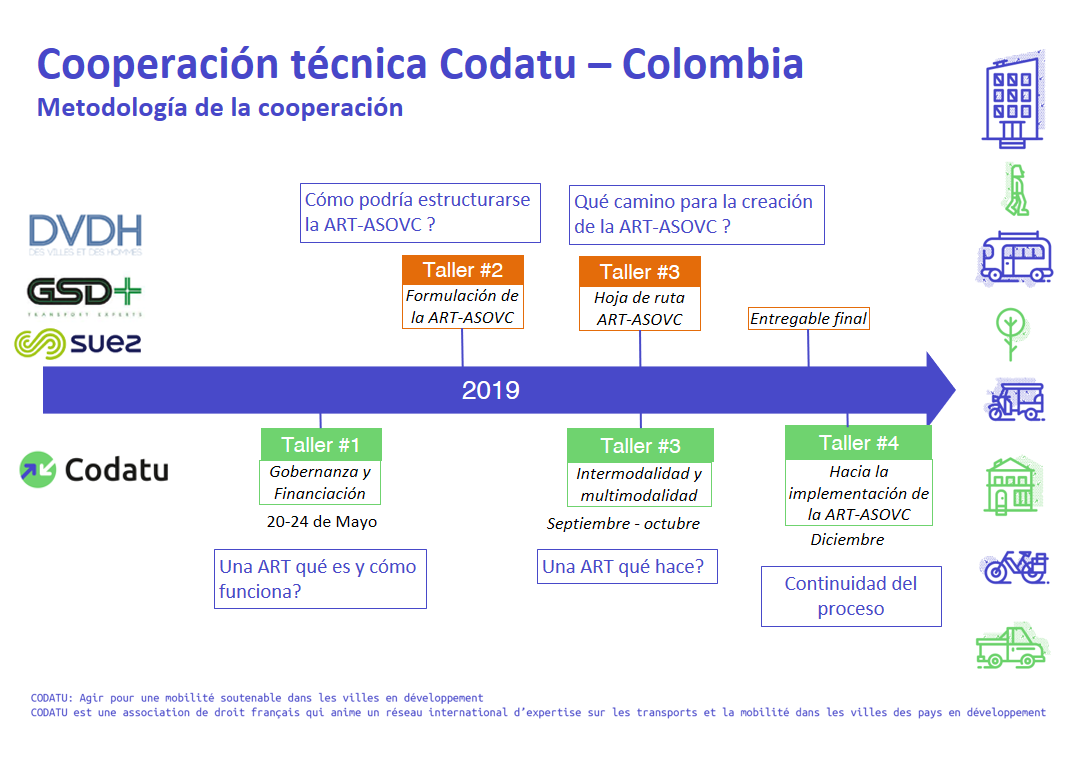[Technical cooperation Colombia] Launching mission in Cali
CODATU launched a technical cooperation in partnership with the French Development Agency (AFD) in Cali (Colombia) on metropolitan governance in public transport. The cooperation aims to support local authorities in the implementation of a “Regional Transport Authority” (ART) in the metropolitan area of Cali. The cooperation is part of a broader project of a local train linking Cali and the neighboring municipalities (the project is currently in prefeasability stage, conducted by SYSTRA).
The mission programme and objectives
Th one-week launching mission took place from 1 to 5 April 2019. The aim was to conduct a series of interviews with key institutions of the current insitutional transport organization and to share publicly the purpose and the methodology of the cooperation during a closing event.
The CODATU team first met with national institutions in Bogotá to understand the legal framework currently under development for the implementation of “Regional Transport Authorities” (ART) in Colombia. Then the team had an opportunity to dialog with local stakeholders in Cali: the Valle del Cauca government, the councils of Cali, Yumbo, Palmira and Jamundí in order to understand how public transport is currently organized and what the challenges that arise from this organization.

Meeting with CODATU, ProPacífico and GSD+ and managers of the Transport, Infrastructure and Planning Department of the Jamundí Municipality. Source: Jamundí Municipality
Results and meetings
Transport organization and legal framework
The institutions currently relevant for public transport are the municipalities, in charge of municipal transport, and the Ministry of Transport, in charge of intermunicipal short and long distance transport. The regional government is responsible for municipal transport in municipalities that are too small to have a local transport authority within their administration.
In some Colombian cities, Metropolitan Areas comprising neighboring municipalities have responsibility of transport (as well as the environment and territorial planning) at the metropolitan scale. However, only six Colombian agglomerations today benefit from this status, particularly because of the complexity of the process of setting up Metropolitan Areas and the political reluctance of municipalities to associate.
In this context, the national government created in 2015 “Regional Transport Authorities” (ART), as structures of association of territorial entities dedicated to the organization of transport on a supramunicipal scale. But these structures remain vague in the law and have never been implemented in Colombian cities. Everything remains to be done, and discussions are currently underway within national institutions to define more clearly the skills and the process of setting up these ART.
According to the interviews carried out by the CODATU team with the institutions, it seems that the law will first propose the creation of intermunicipal agreements that could allow to create special conditions to optimize the transport supply at the metropolitan level. In a second time, this structure would be consolidated in AOT or even AOM, based on a legally constituted territorial associative scheme.
Main challenges identified
– The lack of visibility of responsibilities towards the user appears to be a major challenge for municipalities, which generally appear to have full responsability for municipal and intermunicipal transportation.
– The absence of urban, fare and operation integration of the different transport systems.
– The inadequacy of intermunicipal roads operated for several decades, and the operating excesses of intermunicipal buses that offer an urban service through wild terminals, are also presented as issues that contribute to congestion in Cali.
– Public transport in small municipalities has also its challenge such as the competition between formal and informal transport (especially “mototaxi”), the lack of municipal public system of transportation to connect urban and rural areas, and the low investment capacity of administrations.
– In addition, bus companies are generally reluctant to any process of changing roads or reorganizing transport, which could be contrary to their own financial interests.
– Finally, road safety, especially for intermunicipal buses, appears to be one of the main concerns of municipalities; the Valle del Cauca department has the second highest rate of accident in Colombia.
The cooperation launch event
The closing event provided an opportunity to present a first feedback on the collected information and to present in more detail the cooperation methodology.
Representatives from seven of the ten municipalities involved in the project attended the event, as well as representatives of the departmental government and of the French Development Agency (AFD).
The two components of AFD’s FEXTE financing have been specified. On the one hand the CODATU technical cooperation looks to reinforce the capacities of local administrations on the subject of Transport Authorities. On the other hand a study of institutional, organizational, technical and financial structuring of the ART will be carried out by the Franco-Colombian consortium Suez-DVDH-GSD +. These two parallel processes will be articulated so that the CODATU workshops’ outputs can feed the structuring study.

Launching event in Comfenalco – Cali on the 5th of april. Source : ProPacífico
For this year the FEXTE will be carried out in 5 stages:
- What is a Transport Authority and how does it work?
- Which scenarios for the structuration of the Valle del Cauca Regional Transport Authority?
- What does a Transport Authority do (territory, intermodality, multimodality)?
- What is the plan of actions for the implementation of the Valle del Cauca Regional Transport Authority?
- Process of political continuity with the new municipal and departmental administrations
This first step will be realized though the organization of the first CODATU workshop from 20 to 24 May 2019 on governance and AOT financing issues.

Programme of the technical cooperation in 2019. Source: CODATU.
Learn more about…
- the Franco-Colombian consortium that conducts the structuring study: DVDH – GSD+
- the CODATU technical cooperation in Colombia
